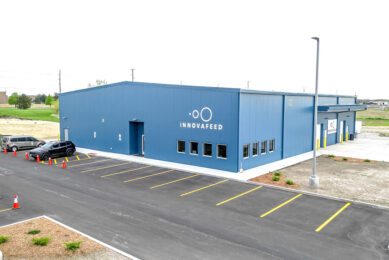Belarus domestic feed industry reaches the next level

Belarus has completed the first stage of building the Belarus National Biotechnological Corporation (BNBC) – the most expensive and ambitious project embarked on in the country’s agricultural industry over the past few decades.
This project consists of 14 feed and feed additive plants. The first one began operating on 10 August.
“At this plant, we will be producing a balanced and highly effective premix for all farmed animals,” said Alexander Bildyukevich, director of BNBC’s biotechnological division, speaking during the opening ceremony. “The complex is designed to generate revenue of US$ 650 million per year. This is slightly less than that of only 2 other Belarus companies, Naftan and Mazyr (oil processing plants),” said Daniel Uritsky, director of BNBC, adding that the production of amino acids, the cornerstone of the project, should begin in March 2021. The complex is designed to produce 1 million tonnes of feed, but it is amino acids that should be the main export commodity and generate the most added value and revenue.

BNBC aims to produce 200,000 tonnes of feed additives, including lysine, L-threonine, L-tryptophan and gluten, among others. This is to capture from 5% to 10% of the European Union’s feed additives market, while selling substantial quantities to Russia, Ukraine, and several other countries in the former Soviet Union. The company has already signed export contracts worth US$ 500 million, the BNBC press office reported. In particular, some initial export contracts have been inked in with customers in Norway. Besides that, BNBC has concluded an agreement with ‘a global trading company’, which is described as “the biggest supplier of amino acids to European customers” and which will promote feed additives of Belarus origin. No additional information on that contract has been disclosed so far. “Our partners are looking forward to the launch of more plants. They are very interested in our production,” Ilya Snopkov, director of BNBC, said.

BNBC was the first company Belarus President Alexander Lukashenko visited after his controversial re-election in August. “Only 4 companies in the world have production at the same level. This is a brand new production complex that will purchase 700,000 tonnes of Belarusian grain per year at the most competitive global prices,” Lukashenko said during his visit. Lukashenko also ordered the government to make sure that BNBC is adequately supplied with raw materials. The main raw material for lysine production is triticale, of which Belarus is one of the world’s largest producers. “In the future, the BNBC plans to grow its own grain to meet domestic needs,” Lukashenko said. BNBC will consume nearly 10% of all grain harvested in Belarus. In 2020, the country is likely to have increased its grain harvest to at least 8.2 million tonnes this year from 7.33 million tonnes in 2019, the government estimated.
 Futures market
Futures market
Overview of futures prices for: corn, wheat and soybean
Rolling with the punches
BNBC has been launched according to its original schedule, even despite the Covid-19 pandemic. According to Lukashenko, this happened thanks to his decision not to introduce a nationwide quarantine in the initial period of the coronavirus pandemic. “There was some luck in this misfortune. The coronavirus put the economy worldwide on hold and it just happened that one of the world’s most powerful companies is based in Belarus. It is our luck that we chose the right tactics and did not shut down the country,” Lukashenko said.
Indeed, Alexander Lukashenko refused to introduce a nationwide lockdown. During the past few months, he has been making somewhat controversial statements, calling fears of the coronavirus epidemic a ‘psychosis’ and suggesting that vodka or a sauna would help combat the disease. “Nobody is going to die of coronavirus in our country. I’m announcing this publicly. It’s my firmly held conviction,” Lukashenko said, speaking during a press conference on April 13. Against this background, the BNBC construction has also been taking place without delay. The President also made it clear that any delays would incur substantial losses for the country’s treasury, which have to repay a US$ 650 million loan provided by Chinese state banks.
“By whatever means, we should not allow any delays. The enterprise must be built on time because it must work, become profitable, and the money that we borrowed (from China) will, of course, will have to be gradually repaid (by 2032),” Lukashenko said. However, there are mounting fears that the project could be negatively affected by the ongoing political unrest. Belarus has been in turmoil after the disputed presidential election on 9 August that led to mass protests and arrests. The Belarusian government responded to demonstrations with unprecedented violence, according to a statement by UN human rights experts released on 1 September. The UN experts received reports of 450 documented cases of torture and other maltreatment of individuals. The police violence has prompted the opposition to change tactics and call for a nationwide strike.
 Russian livestock producers concerned as grain prices soar
Russian livestock producers concerned as grain prices soar
Record-breaking grain prices could impair growth in the Russian poultry and pork industry and cause thousands of farms to incur losses, according to analysts.
As of early September, the strikes have affected 10 major state-owned companies in Belarus, including one of the world’s major potash fertiliser producers Belaruskali. As a result of the protests, the Belarusian Rouble lost more than 10% of its value against the euro and the US dollar over the last month. During this period, its exchange rate slumped by 27% against the US dollar and 33% against the euro. This inevitably increases construction costs, but there is also a positive side, as all products of Belarusian origin will be more affordable for foreign customers.
So far, strikes have only hit state-owned companies, which means that the construction is on relatively safe ground. The general contractor of the BNBC construction project is the Chinese CITIC Construction Co. Ltd. However, the strikes are reportedly beginning to affect the agricultural industry, farms, feed mills, and processing plants, most of which are state-owned. There are also fears that the political crisis could harm the prospects for trade between Belarus and the European Union. According to Andrey Sizov, director of the Russian analytical agency SovEcon, Belarus’s agriculture seems to be very strong, but to a large extent, this is only possible due to vast amounts of state aid. At some point, the industry may need to go through painful reforms, he added. On the other hand, with the Lukashenko regime still in place, Belarus has to cope with new EU sanctions, the extent of which is still unclear.
Export opportunities
The new complex should boost the competitiveness of the Belarus livestock industry. Belarus is currently exporting agricultural products worth US$ 5 billion per year, US$ 2.15 billion of which is accounted for by dairy production, the country’s Agricultural Ministry estimated. The dairy industry’s production capacity nearly exceeds domestic demand by 3 times, with per capita production at 730 kg believed to be one of the highest in the world. It is estimated that Belarus accounts for 4% to 5% of global dairy exports.
 Russia embraces new trends
Russia embraces new trends
Russian farmers find themselves in a new reality as over the past few years, the country’s environmental-protecting organisations have become a force to be reckoned with.
Exports should be the primary sales channel for BNBC. In total, BNBC plans to export 80% of the manufactured product, the company reported. Among other things, BNBC will establish a scientific and research department to look into ways of cutting costs and making products more attractive pricewise for foreign customers. “We have no information that the Belarussian side has filed for the Russian veterinary watchdog Rosselhoznadzor’s certificate to sell on the Russian market, which is mandatory. It takes 6 months to get a green light once an application is submitted,” Sergey Mikhnyuk, chairman of the Russian National Feed Union, said.
They have to get in touch with Rosselhoznadzor, invite the Russian inspectors to their production facilities, and simultaneously launch an advertising campaign in our market. We haven’t seen this yet,” Mikhnyuk added.
“It is also uncertain which products they plan to supply to Russia. No information on that is available right now. The Russian premix market is pretty tight, even oversaturated, so there is no really a room for new market players,” Mikhnyuk said. According to Mikhnyuk, there is also a price issue, since it is still not clear where BNBC plans to source enough grain to meet the internal demand. “If they are going to purchase Ukrainian grain, it is a big question at what price and how this could be impacted by Belarus’s membership of the Eurasia Economy Union,” he said.
“The Russian and Ukrainian markets look like the most promising targets for BNBC’s production,” commented a source in the local feed industry who wished not to be named. “Europe and China already have highly competitive suppliers of lysine, threonine, and other amino acids. BNBC could become a major supplier of feed additives to the West, as long as the products are of the highest quality and are sold at a very competitive price. Belarus has rather cheap labour and a good raw materials base, but I would not say that it will be easy to be successful in Europe,” the source added.











